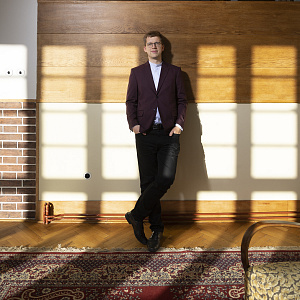
MAREK KOZÁK
SHARING PASSION FOR MUSIC IS WONDERFUL!


Czech 19th- and 20th-century music is not only about Dvořák and Martinů… That is proved by a new album containing three piano concertos that deserve to be re-discovered. They are Piano Concerto in D minor by Vítězslava Kaprálová, Piano Concerto in F minor by Karel Kovařovic and Piano Concerto No. 2 by Pavel Bořkovec, which reflect different styles and periods of Czech music history. All of them have been recorded by outstanding Czech pianist Marek Kozák, who is famous for his success at competitions and for his original repertoire. He is accompanied by the Prague Radio Symphony Orchestra under the baton of Robert Jindra. We talked to Marek Kozák just before the release of Forgotten Czech Piano Concertos.
What was the most challenging thing in the making of this album and what did you enjoy most?
I enjoyed especially the beautiful and largely unknown music of these three great composers. It is always refreshing if you discover something that is basically unperformed. Of course, the music must be worth performing, which is undoubtedly the case of these three concertos. Naturally, there were some challenges. For example, there are no reductions for two pianos of these concertos and I had to learn the Kovařovic piece from the manuscript! However, the joy prevailed over the difficulties.
What was it like to work with conductor Robert Jindra and the Prague Radio Symphony Orchestra?
Robert Jindra and I are birds of a feather because of our penchant for re-discovering “forgotten” music. It was wonderful to share our joy of and passion for music. And working with the Prague Radio Symphony Orchestra was delightful; many of its members are my friends. It is an orchestra consisting of great musicians who play best once the red light is on and the show is on.
What is your view on the legacy of Vítězslava Kaprálová?
Her legacy is really remarkable. Her untimely death was a real loss for Czech 20th-century music. She wrote her piano concerto on the occasion of her graduation from Brno Conservatoire at the age of eighteen. The fact that she conducted its performance at her graduation concert in 1935 caused quite a stir.
Karel Kovařovic composed his only piano concerto at the same age as Kaprálová. How did you approach rehearsing his Concerto in F minor?
I had been day-dreaming of recording Karel Kovařovic’s concerto for a long time. When I was a student, I would often listen to an old recording (probably the only that survives) of it by pianist Zdeněk Jílek and the Prague Radio Symphony Orchestra. It is a nice coincidence that Zdeněk Jílek was a teacher of Monika Tugendliebová, who taught me at Janáček Conservatoire in Ostrava. I admired the Romantic exuberance that prevails in the concerto. It is also a rarity in terms of repertoire because apart from concertos by Antonín Dvořák and Vítězslav Novák it is the only Czech concertante piece of the second half of the 19th century.
Pavel Bořkovec, who studied with Foerster and Suk, wrote his concerto after WWII, as a mature artist. At that time he was already shaping another generation of important Czech composers (P. Eben, J. Novák, V. Sommer and others). What would you point out to your listeners about his concerto?
As you say, unlike those by Kovařovic and Kaprálová, Bořkovec’s concerto is a work of a mature composer. He was fifty-six when he wrote it. Logically, it is the most perfect of the three works as regards the craft of composing. As an experienced composer, he was aware of the big risk of piano concertos, which is the solo piano part being frequently drowned by dense orchestration. In some passages of large Romantic concertos, listeners often only see the soloist at the piano. They can only hear him with a fair amount of imagination. Bořkovec prevented this bad habit shrewdly, basing his concerto on the solo part frequently alternating with orchestral passages combined with dialogues between different instrument groups. However, the perfection of his artistry doesn’t rule out youthful freshness, which the piece abounds in. And listeners will surely notice his reference to the Czech folksong, “O hřebíčku zahradnický” (Oh, Clove Pink).
You have achieved success at many competitions (in Zurich, Bolzano, Bremen, Prague, etc.). Which success was essential for you?
Paradoxically, what proved essential for my development in music was my “failures” at competitions, which aren’t mentioned very often. They always made me move forward and provided lots of stimuli. From the point of view of my career (although I really dislike the word “career”), the most important ones were the Géza Anda Competition in Zurich and the Prague Spring Competition.
Could you tell us about your concert plans?
I am now rehearsing the second part of The Well-Tempered Clavier by Johann Sebastian Bach, which I will be playing at the Smetana Litomyšl Festival in June. I will be giving a recital with violinist Hana Kotková at the Leoš Janáček International Music Festival and concerts with soprano Simona Šaturová at three festivals: Lípa Musica, Janáček Brno and Za poklady Broumovska (Treasures of Broumovsko). I am really looking forward to several recitals in Italy. In autumn I will also be performing in Prague but I can’t tell you more about that now.